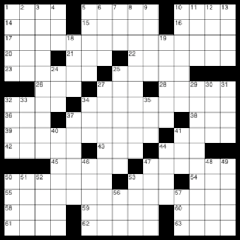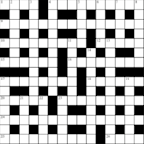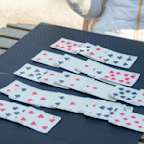Search results
Results From The WOW.Com Content Network
A 15x15 lattice-style grid is common for cryptic crosswords. A cryptic crossword is a crossword puzzle in which each clue is a word puzzle. Cryptic crosswords are particularly popular in the United Kingdom, where they originated, as well as Ireland, the Netherlands, and in several Commonwealth nations, including Australia, Canada, India, Kenya, Malta, New Zealand, and South Africa.
Genre (s) Word game. Mode (s) Single-player. The New York Times Crossword (marketed as The Crossword) is a daily American-style crossword puzzle published in The New York Times as part of The New York Times Games, online on the newspaper's website, syndicated to more than 300 other newspapers and journals, and on mobile apps.
An American-style crossword grid layout. A crossword (or crossword puzzle) is a word game consisting of a grid of black and white squares, into which solvers enter words or phrases ("entries") crossing each other horizontally ("across") and vertically ("down") according to a set of clues. Each white square is typically filled with one letter ...
Crossword. Solve puzzle clues across and down to fill the numbered rows and columns of the grid with words and phrases. By Masque Publishing. Last Played.
The abbreviation is not always a short form of the word used in the clue. For example: "Knight" for N (the symbol used in chess notation) Taking this one stage further, the clue word can hint at the word or words to be abbreviated rather than giving the word itself. For example: "About" for C or CA (for "circa"), or RE.
The verb stays singular. If a plural verb is used as in Á carir it means "let them do it" referring to persons not present or at any rate not addressed directly. Copula. The copula in late Quenya is the verb na-. Tolkien stated that it was used only in joining adjectives, nouns, and pronouns in statements (or wishes) asserting (or desiring) a ...
On 18 August 1942, a day before the Dieppe raid, 'Dieppe' appeared as an answer in The Daily Telegraph crossword (set on 17 August 1942) (clued "French port"), causing a security alarm. The War Office suspected that the crossword had been used to pass intelligence to the enemy and called upon Lord Tweedsmuir, then a senior intelligence officer ...
Printer's Devilry. A Printer's Devilry is a form of cryptic crossword puzzle, first invented by Afrit ( Alistair Ferguson Ritchie) in 1937. A Printer's Devilry puzzle does not follow the standard Ximenean rules of crossword setting, since the clues do not define the answers. [1] Instead, each clue consists of a sentence from which a string of ...
Note the example of a compound like "foxhunt": although this matches the direct-object+verb pattern, it is not grammatically used in a sentence as a verb, but rather as a noun (e.g. "they're hunting foxes tomorrow" ~> "they're going on a foxhunt tomorrow", but "not" *"they're foxhunting tomorrow").
The central English modal auxiliary verbs are can (with could ), may (with might ), shall (with should ), will (with would ), and must. A few other verbs are usually also classed as modals: ought, and (in certain uses) dare, and need. Use ( /jus/, rhyming with "loose") is sometimes classed so as well.








